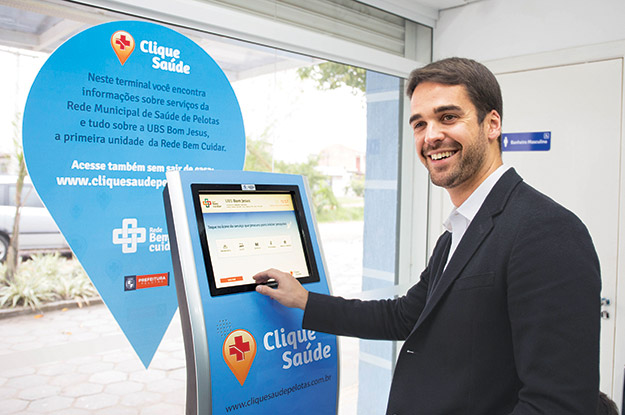This article is adapted from AQ’s most recent issue, “Fixing Brazil.” To see the rest of our Top 5, click here.
When Eduardo Leite ran for mayor of the small city of Pelotas in Brazil’s southernmost state of Rio Grande do Sul, the son of university professors did not have much of a political network to call on. So why — four years after his surprise victory — does he command a steadily expanding circle of powerful friends and boosters, ranging from a former president to national party leaders?
Possibly because he represents the kind of politician in desperately short supply in contemporary Brazil. Unlike most people his age, the 31-year-old Leite has refused to give up on the kleptocratic and scandal-ridden political system that has turned off many young professionals. “It makes no sense to just go against the political system and not participate,” he told AQ. “You have to participate to change it.”
Leite’s rise to national prominence began from far outside the political system. Not only is his home city well outside the national radar — the third largest (population 350,000) in Brazil’s southernmost state of Rio Grande do Sul — he shies away from personality politics in a country where political cynicism is rampant, and where the average age of legislators is 54.
Nevertheless, Leite is no political innocent. At age 20, he was already chief of staff to the sitting mayor, while studying for a law degree at the Federal University of Pelotas. At 23, he was appointed city councilman to fill a vacancy, later winning election to the position. By 2011, he was council president, which propelled his successful mayoral run the following year on the ticket of the centrist Brazilian Social Democracy Party.
Once in office, Leite focused on health, education and infrastructure. He implemented Pelotas’s first urgent care unit, a nationally recognized disease prevention program, and a maternity program credited with reducing infant deaths. He expanded early childhood education, and oversaw the first public bidding in city history for a transportation concession, which allowed Pelotas to upgrade its bus fleet.
Today, seven out of 10 people in Pelotas approve of Leite. That alone would be enough to earn him attention in a country where most politicians’ approval ratings hover in the 10 to 30 percent range.
Yet, rather than seek reelection, as popular (and also not-so-popular) Brazilian politicians usually do, Leite declared that he would step aside, because he is a believer in term limits. This move was so rare that it won him a modicum of national attention from many voters who wish others would do the same.
His political career is far from over, though. Leite is considering a run for congress in 2018, and some important people are rooting for him to get there. His circle of supporters includes former President Fernando Henrique Cardoso, as well as influential families in São Paulo and elsewhere. “Thankfully, the new generation of Brazilian politicians has good managers,” Cardoso told AQ. “Eduardo Leite is an example of that.”
—
Kurczy is a special correspondent for AQ.



